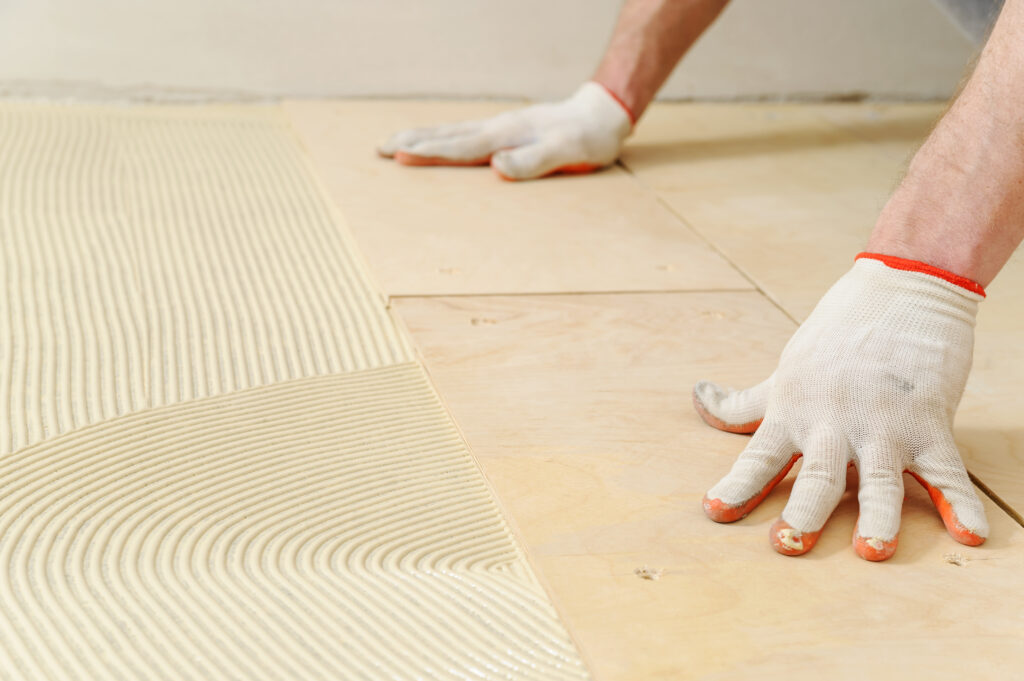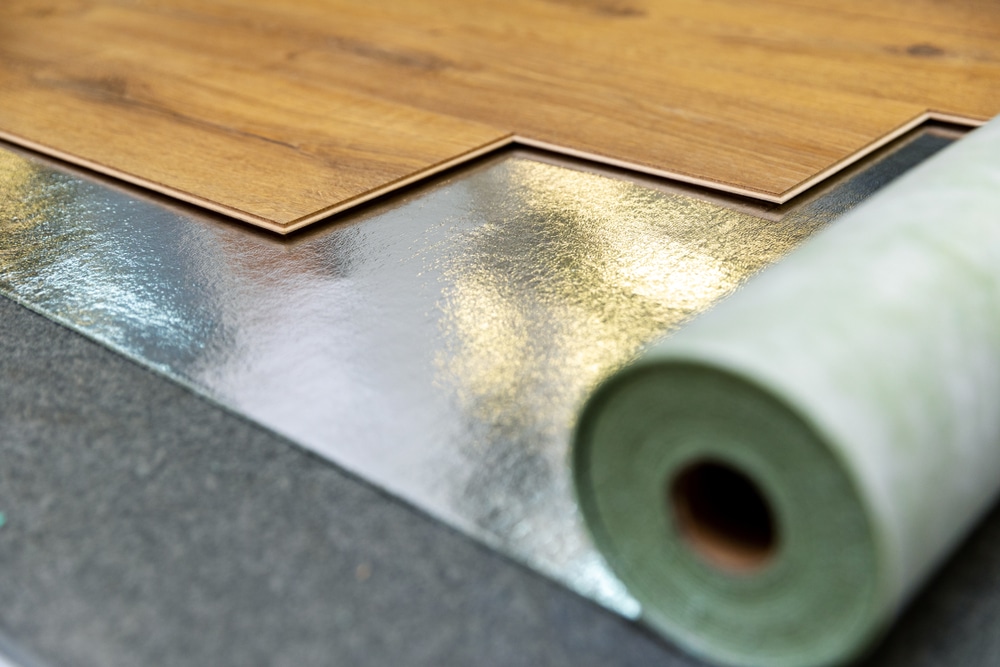When it comes to installing vinyl sheet flooring, one often overlooked but crucial aspect is the underlayment. The underlayment for vinyl sheet flooring not only provides a smooth surface for the vinyl to adhere but also plays a significant role in the longevity and performance of your flooring.
Choosing the right underlayment can make all the difference in the world when it comes to the comfort and durability of your vinyl floors. This article aims to guide you through the process of selecting the ideal underlayment for your vinyl sheet flooring project.
What Is Underlayment?
Underlayment is a layer of material installed between a subfloor and the floor covering or finish floor. This intermediate layer serves several purposes depending on the type of flooring and the specific needs of the space.
It’s typically made of materials such as rubber, cork, or foam and comes in rolls or sheets that can be cut and laid out across the installation area.
Notably, underlayment performs four key functions. First, it provides a smooth, even surface for the finish floor, thereby enhancing the final appearance and functionality.
Second, it offers padding that adds comfort underfoot and can reduce wear and tear on the finish floor. Third, it helps absorb sound, making the environment quieter.
Moreover, some underlayments act as a moisture barrier, protecting the finish floor from potential water damage.
The Importance of the Right Foundation
Choosing the right foundation or underlayment for your vinyl sheet flooring is a crucial step that should not be overlooked. The underlayment is not just a simple layer beneath your vinyl; it’s a backbone that provides vital functionality and ensures the longevity of your floor.
Firstly, a suitable underlayment provides a level and smooth surface, indispensable for the correct installation of vinyl flooring. Any irregularities or imperfections on the subfloor can transfer to the vinyl, affecting the appearance and performance of the flooring.
The underlayment acts as a cushion, enhancing the comfort underfoot. A good-quality underlayment can make your vinyl floor feel softer and warmer, contributing to a comfortable and cozy living environment.
Underlayment plays a significant role in sound absorption. It can significantly reduce the noise when walking on the floor, contributing to a quieter and more peaceful home.
Moreover, the right underlayment can help protect your vinyl sheet flooring from moisture damage. Some types of underlayment offer a moisture barrier that prevents any moisture from the subfloor from reaching the vinyl, thereby increasing the lifespan of your floor.
Overall, selecting the right foundation for your vinyl sheet flooring is an investment that pays off in the long run. It enhances the durability, performance, and feel of your flooring, ensuring that you enjoy the benefits of your vinyl floor for years to come.
Underlayment Options for Vinyl Sheet Flooring
1. Plywood Underlayment

Plywood is a popular choice for underlayment in the flooring industry. It’s sturdy, durable, and offers an even and smooth surface, making it ideal for vinyl sheet flooring. Plywood underlayment comes in various thicknesses, allowing you to choose the level of support you require.
While plywood is great for leveling an uneven subfloor, it’s worth mentioning that it does not naturally offer a moisture barrier. This means that if your installation area is prone to moisture or humidity, additional steps might be necessary to prevent potential moisture damage to your vinyl sheet flooring.
Another drawback to consider is noise reduction. Plywood does not excel in sound absorption compared to alternatives like cork or foam. If minimizing noise is a top priority, plywood might not be your best option.
Despite these considerations, many professionals still prefer plywood for its robustness and long-lasting performance.
As with any flooring decision, it’s crucial to assess your individual needs, the specific conditions of your installation area, and your budget to make the most suitable choice.
2. Cement Board Underlayment

Cement board underlayment is a robust and stable option that’s excellent for vinyl sheet flooring. It is particularly beneficial in areas that are susceptible to moisture or high humidity, like kitchens or bathrooms, due to its moisture resistance.
This attribute sets it apart from plywood, eliminating the need for additional moisture barrier steps during installation.
The density of cement board underlayment ensures a solid and flat surface for the vinyl sheet flooring, enhancing its longevity and performance. The rigidity of the cement board prevents the possibility of deflection, which could otherwise lead to damage or the loosening of your vinyl flooring over time.
However, it’s worth noting that cement boards tend to be more labor-intensive to install compared to plywood. Cutting and laying cement boards require a certain level of expertise and may involve more time and effort.
Also, although cement boards offer exceptional moisture resistance, they do not contribute significantly to sound dampening.
In summary, while cement board underlayment is a more expensive and labor-intensive option, its exceptional moisture resistance and durability make it a wise investment for vinyl sheet flooring, especially in moisture-prone areas.
3. Foam Underlayment

Foam underlayment for vinyl sheet flooring is another viable option, especially popular due to its cost-effectiveness and ease of installation.
Foam underlayments are lightweight, easy to cut, and simple to lay down, which can significantly reduce installation time and labor costs. They are particularly suitable for areas where significant sound reduction is a priority, as they provide excellent sound-dampening properties.
The foam underlayment also offers a degree of thermal insulation, contributing to energy efficiency and comfort in colder climates. However, when it comes to moisture resistance, foam underlayment may not perform as well as cement boards.
While some foam underlayments come with an attached moisture barrier, they may not be the best choice for highly moisture-prone areas like kitchens or bathrooms.
In terms of durability, foam underlayment might not be as robust as cement boards. Over time, heavy furniture or high traffic can cause indentations or compression in the foam, potentially affecting the appearance and performance of your vinyl sheet flooring.
Foam underlayment could be an excellent choice for vinyl sheet flooring in terms of cost-effectiveness, ease of installation, and sound reduction. However, for areas prone to high humidity or heavy use, other options might be more appropriate.
4. Felt Underlayment

Felt underlayment is another excellent option you might consider when selecting the ideal underlayment for your vinyl sheet flooring. Felt underlayment, often made from recycled fibers, is renowned for its superior sound absorption properties, making it a solid choice for reducing noise transmission in multi-story homes or apartments.
In addition to its acoustic benefits, felt underlayment is highly resilient and can stand up quite well to heavy traffic over time.
This durability can be an important factor for areas with high foot traffic, ensuring your vinyl flooring maintains its appearance longer.
When it comes to moisture resistance, many felt underlayments are treated to resist mold and mildew, thus enhancing the lifespan of your flooring in damp environments.
However, they might not offer the same level of moisture protection as cement boards, making them less suitable for areas such as bathrooms or basements where water exposure is a concern.
Felt underlayment does come with a higher price tag compared to foam underlayments, but its benefits in sound reduction, resilience, and longevity often justify the cost.
Related Topics:
Factors to Consider When Choosing Underlayment
Durability
When selecting an underlayment for your vinyl sheet flooring, durability should be a top consideration. The underlayment plays a key role in maintaining the integrity and longevity of your flooring over time.
A durable underlayment will be able to withstand heavy foot traffic, resist damage from furniture, and help prevent wear and tear on your flooring. It’s important to consider the type of room where the flooring will be installed and the amount of traffic it will receive.
High-traffic areas such as hallways and living rooms may require a more durable underlayment, like felt, to preserve the life and appearance of your vinyl flooring. Conversely, for rooms with less traffic, a foam underlayment may be sufficient.
Cost
Budget is a significant factor when deciding on the type of underlayment for your vinyl sheet flooring. The total cost of your flooring project will include both the cost of the vinyl flooring itself and the underlayment.
Foam underlayment tends to be the most affordable option, making it an attractive choice for those on a tight budget.
However, while it is less expensive upfront, it may not provide the same durability and sound reduction as felt underlayment, potentially leading to higher costs in the long run due to quicker wear and tear.
On the other hand, felt underlayment, while more expensive, offers superior durability and noise reduction, potentially giving better value for money in the long run, especially in high-traffic areas.
Installation Process
The installation process of underlayment for vinyl sheet flooring is another crucial factor to consider. Different types of underlayment require different installation methods, which can affect both time and cost.
For instance, foam underlayment is typically easy to install, often coming with a self-adhesive side that sticks directly to the subfloor. This can save time and reduce the need for additional adhesives or tools.
On the other hand, felt underlayment, with its higher density, may require more effort and special equipment for proper installation. The complexity of the installation process might also determine whether you can install it as a DIY project or if you will need to hire a professional.
It’s essential to understand the installation process of each underlayment type before making a decision, taking into account your DIY skills, the available tools, and your budget for professional installation services.
Compatibility with Vinyl Sheet Flooring
The compatibility of the underlayment with the vinyl sheet flooring material is an essential aspect to consider. Not all underlayment types work well with vinyl sheet flooring. For instance, thicker underlayment materials like felt can cause vinyl flooring to buckle or warp over time, especially at the seams.
Therefore, thinner, denser underlayment materials, such as specialized vinyl underlayments or certain types of foam underlayment, are recommended.
These materials provide the necessary support and stability without the risk of damaging the vinyl material. Furthermore, some manufacturers of vinyl sheet flooring specify the type of underlayment to use to maintain the product’s warranty.
Therefore, it’s crucial to consult with the flooring provider or manufacturer to ensure the chosen underlayment is compatible with your specific vinyl sheet flooring.
Conclusion
So, the choice of underlayment for vinyl sheet flooring is crucial and should be made based on your specific needs and conditions.
Plywood underlayment offers an even surface and robustness, cement board provides excellent moisture resistance, foam underlayment is cost-effective and offers great sound dampening, and felt underlayment stands out for its superior sound absorption and resilience.
Each of these choices has its strengths and considerations. Based on the analysis above, if we were to pick one, cement board underlayment seems to offer the most balanced benefits.
Its moisture resistance, durability, and stable surface make it an excellent choice for vinyl sheet flooring, especially in moisture-prone areas. However, remember, that the best choice for you will depend on your specific needs, budget, and installation conditions.
FAQs
What is the best underlayment for vinyl sheet flooring?
While various underlayments offer unique benefits, cement board underlayment is often recommended due to its moisture resistance, durability, and stable surface, which suits vinyl sheet flooring, particularly in moisture-prone areas.
Is underlayment necessary for vinyl sheet flooring?
Yes, underlayment is crucial as it provides additional support and stability, prevents damage to the vinyl material, and aids in sound dampening.
Can I use any underlayment for vinyl sheet flooring?
Not all underlayments are suitable for vinyl sheet flooring. Thinner, denser materials such as specialized vinyl underlayments or certain types of foam underlayment are recommended to avoid damaging the vinyl material.
Does the type of underlayment affect the warranty of my vinyl sheet flooring?
Yes, some flooring manufacturers specify the type of underlayment to use to maintain the product’s warranty. Therefore, it’s essential to consult with the flooring provider or manufacturer on this matter.


1 thought on “What Do You Put Under Vinyl Sheet Flooring: Choosing the Right Foundation”